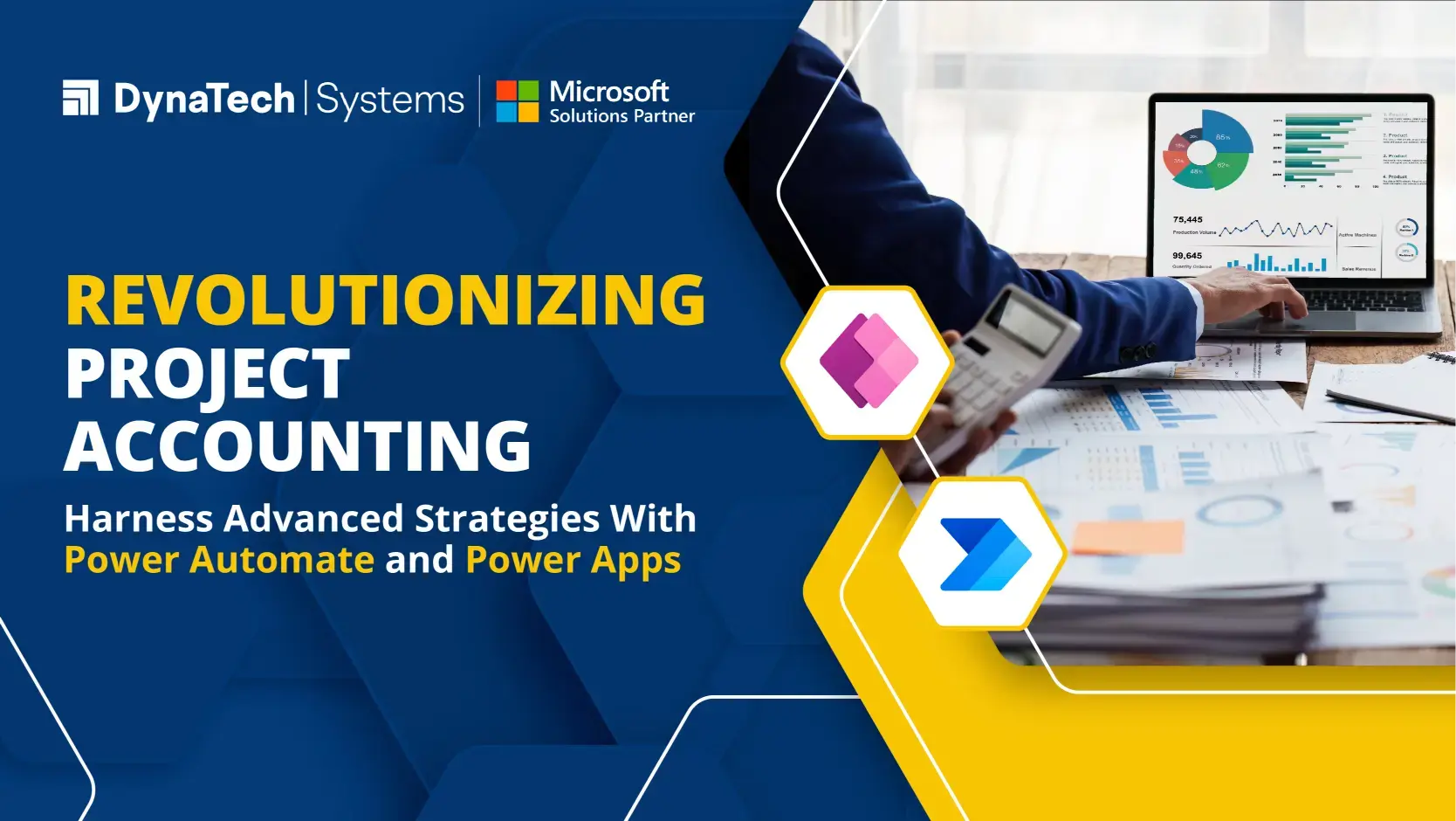In the dynamic landscape of project management, efficient accounting is the backbone of success. Mastering project accounting becomes paramount as organizations strive for precision, real-time insights, and streamlined workflows. In this blog, we delve into the advanced strategies that can revolutionize your project accounting practices, leveraging the power of Power Automate and Power Apps.
Understanding Power Automate and Power Apps
Before we embark on the journey of mastering project accounting, let’s grasp the essence of the tools at our disposal.
- Power Automate is a cloud-based service from Microsoft that empowers the development of automated workflows between various applications and services. It facilitates the seamless integration of different systems, automating repetitive tasks and ensuring data consistency across platforms.
- Power Apps, on the other hand, enables users to develop custom applications without the requirement for extensive coding skills. With a user-friendly interface, organizations can design tailored apps to meet specific business requirements.
Now, let’s explore how these powerful tools can be harnessed for advanced project accounting.
Automated Data Entry and Validation:
Manual data entry is not only time-consuming but also prone to errors. With Power Automate, you can automate the process of data entry, ensuring accuracy and saving valuable time. Create workflows that can easily extract data from various sources, validate it, and seamlessly integrate it into your project accounting system.
For example, you can set up a flow that automatically updates your project ledger whenever new expenses are recorded in your financial software. This not only eliminates the need for manual intervention but also provides real-time visibility into project finances.
Real-time Expense Tracking and Approval:
Efficient expense tracking is crucial for project accounting. Power Apps can be utilized to create a custom expense tracking application tailored to your organization’s needs. Employees can input expenses on the go, and managers can review and approve real-time payments in the app.
Integrate this Power App with Power Automate to automate the approval process. Notifications can be sent to managers for approval, and once approved, the data seamlessly flows into the project accounting system. This not only accelerates the approval process but also ensures that project expenses are consistently and promptly recorded.
Streamlined Invoicing Process:
Invoicing is a critical aspect of project accounting, and any delays or inaccuracies can have significant repercussions. Power Automate can be employed to automate the entire invoicing process. Set up workflows that generate invoices automatically based on predefined triggers such as project milestones or completion.
Furthermore, use Power Apps to create a custom invoice approval app. This app can allow project managers and finance teams to review and approve invoices with a few clicks. By combining Power Automate and Power Apps, you create a seamless and efficient invoicing workflow, reducing the risk of errors and accelerating the cash flow.
Enhanced Reporting and Analytics:
Power BI, a business analytics tool by Microsoft, can be integrated with Power Automate to create comprehensive and dynamic reports for project accounting. Design automated workflows that pull data from your accounting system and other relevant sources, feeding it into Power BI for real-time analytics.
Custom dashboards can provide insights into project profitability, budget utilization, and resource allocation. With this integration, decision-makers can make informed choices based on up-to-the-minute data, contributing to more agile and strategic project management.
Resource Management and Allocation:
Optimizing resource allocation is essential for successful project accounting. Power Apps can be useful in creating a custom resource management application. This app can help project managers visualize resource availability, assign tasks, and track work progress.
Leverage Power Automate to automate resource allocation based on project requirements and employee availability. By connecting this automation with your project accounting system, you ensure that resource costs are accurately reflected in project budgets, contributing to more precise financial planning.
Generative AI Automation for Engagement Letters:
One of the challenges accountants face is the time-consuming process of drafting engagement letters. Generative AI Automation, when integrated with Power Automate, can revolutionize this aspect of project accounting. By training the AI model with your organization’s templates and specific requirements, you can automate the generation of accurate and compliant engagement letters.
Imagine a scenario where, with a simple trigger, the system drafts a customized engagement letter incorporating project details, terms, and conditions. This not only accelerates the client onboarding process but also ensures consistency and compliance across all client communications.
Importing Financial Data with Precision:
Accurate financial data is the lifeblood of project accounting. Power Automate, coupled with Generative AI Automation, can be employed to streamline the importing of financial data from various sources. Whether it’s bank statements, invoices, or expense reports, the system can intelligently categorize and input data into the accounting system.
By utilizing AI algorithms, the system learns to recognize patterns and reconcile discrepancies automatically. This not only reduces the risk of human error but also saves significant time in manual data entry. As a result, accountants can focus on more strategic aspects of financial management.
Ways Accountants Benefit from AI and Power Platforms
Enhanced Compliance and Risk Management: Generative AI Automation can play a pivotal role in ensuring compliance with ever-evolving regulations. By learning and adapting to changes in tax codes and financial regulations, the system can automatically flag potential compliance issues. Power Apps can be utilized to create user-friendly interfaces for compliance checks, streamlining the audit process and mitigating risks.
Optimized Resource Allocation: AI-driven resource management, in conjunction with Power Apps, facilitates optimal allocation of human and financial resources. The system can analyze historical project data, employee skills, and project requirements to recommend the most efficient resource allocation. This not only improves project outcomes but also enhances overall financial performance.
Advanced Machine Learning for Predictive Budgeting: Implement advanced machine learning algorithms for predictive budgeting within your project accounting system. Power Automate can automate data extraction and preprocessing, while machine learning models analyze historical data to predict future budget requirements accurately. This forward-looking approach allows organizations to proactively manage financial resources and allocate budgets more effectively.
Conclusion
Mastering project accounting is no longer a daunting task, thanks to the advanced capabilities of Power Automate and Power Apps. By automating data entry, expense tracking, invoicing, and resource management, organizations can achieve unprecedented efficiency and accuracy in their project accounting practices.
The key to this transformative journey lies in seamless integration and automation. Embrace the power of Power Automate and Power Apps to unlock the full potential of your project accounting processes.
Ready to revolutionize your project accounting? Contact us today to explore how Power Automate and Power Apps can be tailored to meet your organization’s unique needs. Your path to precision and efficiency starts here.




























